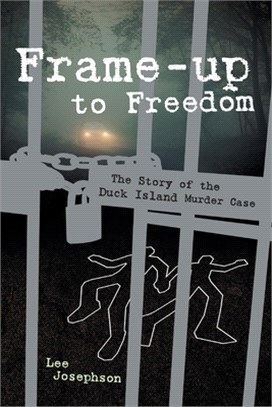Frame-Up to Freedom- The Story of the Duck Island Murder Case
商品資訊
ISBN13:9781098327842
出版社:Bookbaby
作者:Lee Josephson
出版日:2020/12/14
裝訂:平裝
商品簡介
相關商品
商品簡介
Part I: In 1983, the author's mother gives him the papers of Leon Josephson (d. 1966) which included decades of legal research on the Duck Island murder case (1938-1966). Also included are documents concerning Josephson's encounters between 1947 and 1959 with the House Un-American Activities Committee (HUAC). Due to a legal quirk, Leon Josephson served 9 months in a high security Federal penitentiary in Milan, Michigan but emerged a member of the New Jersey bar.
Part II: The lives and deaths of the victims connected to a figure known as the Duck Island murderer are described. They are white men and women of Trenton, 30 to 40 years old, attacked along isolated lovers lanes in Pennsylvania and NJ between 1938 and 1942. They are most often with their lovers, not their spouses, when a man with a shotgun emerges from woods and blows them away.
In 1944 after weeks of brutality in the stockade at Fort Dix (Dix is near Trenton), private Clarence Hill signs confessions covering all 5 attacks police have attributed to the Duck Island murderer. Based on his confessions (lacking a murder weapon and an eye-witness), Hill is convicted of the murder of Mary Mytovich in 1938 on Duck Island near Trenton. But the all-white jury is troubled and recommends leniency in sentencing. Having signed confessions covering 6 murders and 3 rapes, Hill is sentenced to life with eligibility for parole in 1959. He is indicted for all he confessed to in NJ and PA. The Duck Island case is closed and the many prominent white suspects are exonerated.
Mainstream civil rights and civil liberties organizations want nothing to do with Clarence Hill or the two army Colonels who testified to the politeness of the interrogation civilian police conducted in their stockade. Lacking money and organizational support, Hill finds a friend and attorney in Leon Josephson, America'a most controversial Communist attorney. Josephson was imprisoned for contempt of the House of Representatives from March 1948 until January 1949. The FBI monitors Leon Josephson closely and fears Duck Island will now become a cause celebre for the US Communist Party. Leon Josephson tells his son, the author: I only take cases where I can prove the real criminals are those in police uniforms. In Duck Island, Josephson came across the perfect case to teach his young son his views of the capitalist criminal justice system.
Part III: Clarence Hill's confessions are ruled inadmissable by a NJ court and the indictments he is facing for the 5 murders he has confessed to, but has never been tried for, are dropped.
To cope with prison life Hill lives off the hope from his new children, the young Negroes of the civil rights movement unfolding beyond prison walls. Beginning in 1959, the parole board demands Hill refrain from publicizing his story, that false confessions forever closed the Duck Island murder case. By 1959 Josephson is Hill's attorney and only friend.
Mr. Josephson, I won't let it stand, the story a normal Negro is really a murdering monster out to get himself some white girls. Ready to be used on some poor Negro again when they got more big-time sex crimes and no white men to accuse. We must be cleared of what we was accused of long ago. These days, Mr. Josephson, we got freedom on the mind.
Denied parole, Hill is finally released (1964) on medical parole suffering from throat cancer. Josephson pleads Hill's case to the Sloan-Kettering Cancer in NYC. Shocked and saddened that Duck Island could happen in America, Sloan provides Hill medical care, but living with a hole in his throat, and unable to work (a barber), Hill becomes depressed. Josephson again pleads Hill's case to Sloan which gives a confessed serial murderer a job sweeping floors around the bedridden.
Happy to have a small Trenton apartment and job with health insurance, Hill dies in 1973 from cancer.
Part II: The lives and deaths of the victims connected to a figure known as the Duck Island murderer are described. They are white men and women of Trenton, 30 to 40 years old, attacked along isolated lovers lanes in Pennsylvania and NJ between 1938 and 1942. They are most often with their lovers, not their spouses, when a man with a shotgun emerges from woods and blows them away.
In 1944 after weeks of brutality in the stockade at Fort Dix (Dix is near Trenton), private Clarence Hill signs confessions covering all 5 attacks police have attributed to the Duck Island murderer. Based on his confessions (lacking a murder weapon and an eye-witness), Hill is convicted of the murder of Mary Mytovich in 1938 on Duck Island near Trenton. But the all-white jury is troubled and recommends leniency in sentencing. Having signed confessions covering 6 murders and 3 rapes, Hill is sentenced to life with eligibility for parole in 1959. He is indicted for all he confessed to in NJ and PA. The Duck Island case is closed and the many prominent white suspects are exonerated.
Mainstream civil rights and civil liberties organizations want nothing to do with Clarence Hill or the two army Colonels who testified to the politeness of the interrogation civilian police conducted in their stockade. Lacking money and organizational support, Hill finds a friend and attorney in Leon Josephson, America'a most controversial Communist attorney. Josephson was imprisoned for contempt of the House of Representatives from March 1948 until January 1949. The FBI monitors Leon Josephson closely and fears Duck Island will now become a cause celebre for the US Communist Party. Leon Josephson tells his son, the author: I only take cases where I can prove the real criminals are those in police uniforms. In Duck Island, Josephson came across the perfect case to teach his young son his views of the capitalist criminal justice system.
Part III: Clarence Hill's confessions are ruled inadmissable by a NJ court and the indictments he is facing for the 5 murders he has confessed to, but has never been tried for, are dropped.
To cope with prison life Hill lives off the hope from his new children, the young Negroes of the civil rights movement unfolding beyond prison walls. Beginning in 1959, the parole board demands Hill refrain from publicizing his story, that false confessions forever closed the Duck Island murder case. By 1959 Josephson is Hill's attorney and only friend.
Mr. Josephson, I won't let it stand, the story a normal Negro is really a murdering monster out to get himself some white girls. Ready to be used on some poor Negro again when they got more big-time sex crimes and no white men to accuse. We must be cleared of what we was accused of long ago. These days, Mr. Josephson, we got freedom on the mind.
Denied parole, Hill is finally released (1964) on medical parole suffering from throat cancer. Josephson pleads Hill's case to the Sloan-Kettering Cancer in NYC. Shocked and saddened that Duck Island could happen in America, Sloan provides Hill medical care, but living with a hole in his throat, and unable to work (a barber), Hill becomes depressed. Josephson again pleads Hill's case to Sloan which gives a confessed serial murderer a job sweeping floors around the bedridden.
Happy to have a small Trenton apartment and job with health insurance, Hill dies in 1973 from cancer.
主題書展
更多
主題書展
更多書展今日66折
您曾經瀏覽過的商品
購物須知
外文書商品之書封,為出版社提供之樣本。實際出貨商品,以出版社所提供之現有版本為主。部份書籍,因出版社供應狀況特殊,匯率將依實際狀況做調整。
無庫存之商品,在您完成訂單程序之後,將以空運的方式為你下單調貨。為了縮短等待的時間,建議您將外文書與其他商品分開下單,以獲得最快的取貨速度,平均調貨時間為1~2個月。
為了保護您的權益,「三民網路書店」提供會員七日商品鑑賞期(收到商品為起始日)。
若要辦理退貨,請在商品鑑賞期內寄回,且商品必須是全新狀態與完整包裝(商品、附件、發票、隨貨贈品等)否則恕不接受退貨。
























